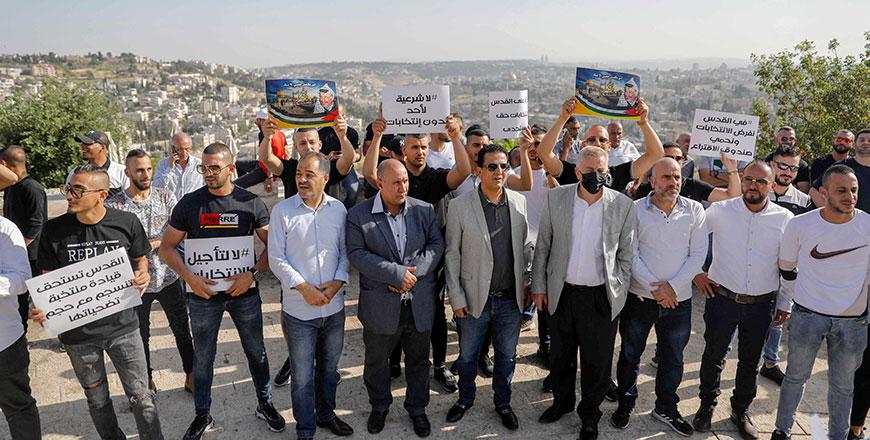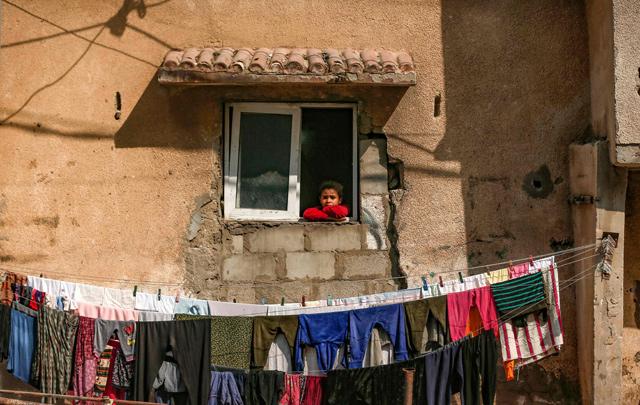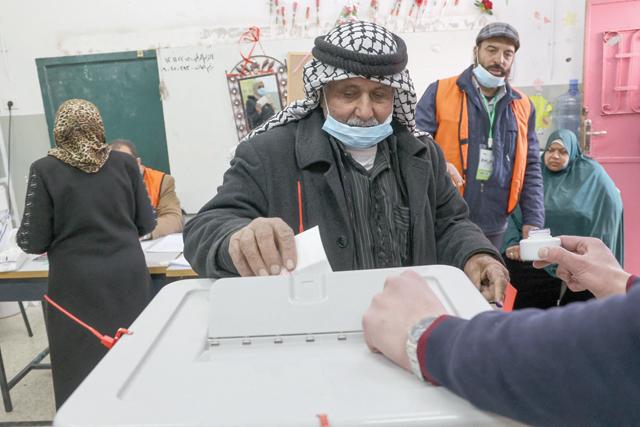You are here
Palestinian vote delay threatens Abbas-Hamas ties — experts
By AFP - May 04,2021 - Last updated at May 04,2021

Palestinian protesters wave national (foreground) and Hamas movement flags during a demonstration in the Jabalia refugee camp in the Gaza Strip on April 30, following the postponement of the upcoming Palestinian elections which were supposed to take place next month (AFP photo)
GAZA, Palestine — Palestinian President Mahmoud Abbas' decision to indefinitely postpone elections could rekindle tensions between his secular Fateh movement and Hamas, piling pressure on Abbas to set a new timeline for a vote, experts say.
Abbas last week declared that legislative and presidential polls set for May and July respectively, which would have been the first Palestinian elections in 15 years, should not be held until Israel guaranteed voting could take place in occupied East Jerusalem.
But even before he announced the delay, Abbas' critics forecast that he might use the complex Jerusalem issue as pretext to put off a vote in which Fateh faced setbacks.
Khalil Shikaki, director of the Palestinian Centre for Policy and Survey research, told AFP the 85-year-old Palestinian president had now confirmed those suspicions.
"It is clear that this [delay] is more about the expectation of the outcomes of the elections rather than the issue of Jerusalem," Shikaki said.
Fateh, which controls the Palestinian Authority based in the occupied West Bank, called the polls as part of a push to mend ties with its long-term rival Hamas, which runs Gaza.
But as the election approached, Hamas was seen as better organised than Fateh, which also faced challenges from splinter groups backed by powerful former insiders.
Shikaki described Abbas' unilateral decision to postpone the votes as "very destructive".
"It is not Israel who defeated the Palestinians, it is Abbas. He is the one making this decision," Shikaki said.
'Escalation'
All Palestinian factions insist that voting be allowed in East Jerusalem, an area they claim as the capital of their future state.
Some 300,000 Palestinians live in the eastern part of the Holy City, seized by Israel in the Six Day War of 1967 and later occupied — a decision not recognised by most of the international community.
Hamas and other Abbas critics have said that hinging elections on whether Israel allows voting in Jerusalem gives Israel an unacceptable veto over the Palestinian right to vote.
Following the postponement, Hamas accused Abbas of perpetrating a “coup” against their partnership.
Rare protests against Abbas immediately flared both in Ramallah and in Gaza City.
For Naji Shurrab, political scientist at Gaza’s Al Azhar University, “the only solution now is to return to the elections.”
Israel has said it will not interfere in Palestinian elections.
But it has not commented on whether it would allow a repeat of the 2006 arrangement that saw some Palestinians symbolically vote at Jerusalem post offices.
Hamas won a surprise victory in that vote, a result not recognised by Fateh.
Hamas took power in Gaza after deadly clashes with their rivals the following year.
Abbas has no obvious solution to the Jerusalem challenge, and Shurrab warned that “an indefinite postponement could lead to an escalation” with Hamas.
The United Nations’ Middle East peace envoy, Tor Wennesland, on Friday voiced support for Palestinian voting in East Jerusalem.
But, he said, “setting a new and timely date for elections would be an important step in reassuring the Palestinian people that their voices will be heard.”
“A prolonged period of uncertainty risks exacerbating the fragile situation,” he added.
Fateh ‘fragmentation’
Abbas spokesman Nabil Abu Rudeina told AFP that Palestinian factions will aim to “reformulate” an new election plan “in the coming weeks”.
But Adnan Abu Amer, a political scientist at Gaza’s Ummah University, told AFP that Fateh’s position could grow increasingly weak as the process drags on.
“Fateh is no longer united as before,” he said, referring to splinter factions including one led by Nasser Al Kidwa, nephew of the late iconic Palestinian leader Yasser Arafat.
Kidwa is backed by the popular Marwan Barghouthi, who is serving multiple life sentences in an Israeli jail.
Mohammed Dahlan, a former Fateh security chief exiled to the United Arab Emirates with access to considerable financial resources, is also challenging Abbas.
Fateh’s “fragmentation will favour Hamas’ interests” and have consequences for relations between them, Amer said.
Jamal Al Fadi at Al-Azhar University said Abbas needed to show “great wisdom” as he considers his next moves.
Otherwise, he warned, relations with Hamas could “deteriorate further”.
Related Articles
RAMALLAH, Palestinian Territories — Palestinian leaders were set to decide on Thursday whether to hold elections next month as scheduled or
OCCUPIED JERUSALEM — The key Palestinian factions — Fateh, which controls the West Bank, and Gaza's Hamas Islamists — plan to meet in Cairo
RAMALLAH, Palestinian Territories — Voters cast ballots on Saturday in towns and cities of the Israeli-occupied West Bank in a rare democrat


















